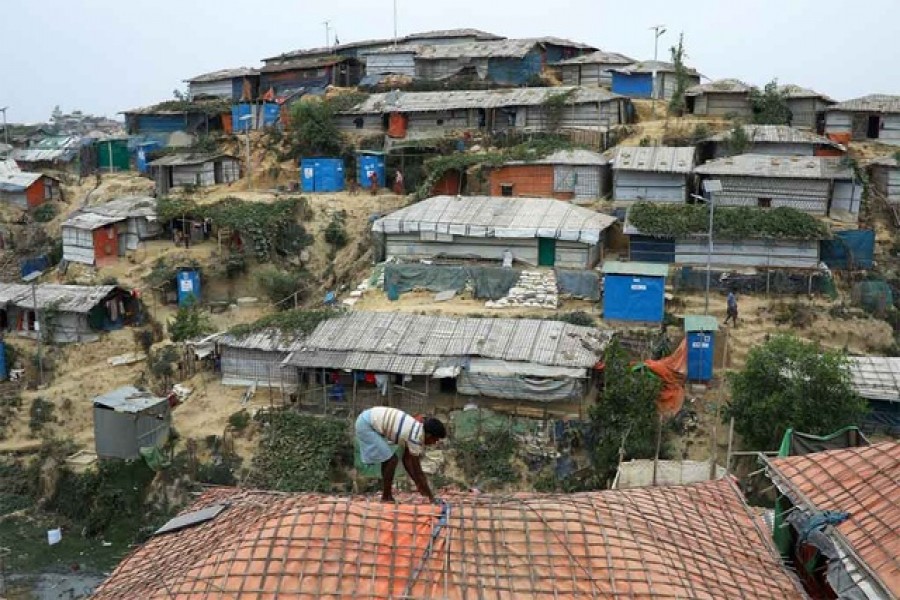
Published :
Updated :

Aged between 10 and 15, with signs of anger clear in their faces and sticks in hands, the boys were vandalising signboards and billboards of different nongovernment organisations inside a Rohingya refugee camp in Cox’s Bazar.
Some were also hitting the makeshift shanties of the refugees at Jadimura in Teknaf.
They were among the people who took to the street on Friday afternoon to protest against the murder of Omar Faruk, a local leader of the ruling Awami League’s youth front Jubo League, allegedly by a group of Rohingya assailants assigned by his rivals.
The international communities have showered Bangladesh with praise after it sheltered over 730,000 Rohingya Muslims who fled a violent Myanmar military-led crackdown dubbed “ethnic cleansing” in Rakhine State two years ago.
A second attempt to start repatriating them fell flat on Thursday as concerns over their security in Buddhist-majority Myanmar remain. The ethnic minority group has reiterated certain demands for return - giving them citizenship, ensuring their security, returning their land and giving compensation for what they have faced.
As security concerns grow among the authorities in Bangladesh over the presence of over 1.0 million Rohingya, the Bangladeshi residents of Cox’s Bazar, where the largest refugee camp is situated, are beginning to dislike the refugees, to shelter whom clearings on swathes of hilly forest land had to be made.
Excessive security measures have become painful to the host community with little or no scope of farming or fishing while rate of crimes among the Rohingya refugees, with no job, has increased.
A UNDP survey earlier this year revealed that two-thirds of the residents of Cox’s Bazar, including all of Teknaf and 80 per cent of Ukhia, believe they have suffered damage because of the Rohingya influx.
A resident of Kutupalong in Teknaf identifying himself only as Fakhruddin said he had depended on farming on a four-acre piece of land to run his family, but it is now being used to shelter the Rohingya.
The man in his 50s is now working as a night guard at a temporary school set up by an NGO called Friendship.
The income is not enough to run his family now, he complained, speaking to it on Friday, bdnews24.com reported.
"Everything was alright for us. But it’s not okay anymore. I have managed a small job, but many others have got nothing,” he said.
Fakhruddin is now concerned about their future as well. “It’s uncertain when the Rohingya will return. And there is no-one to look after us,” he said.
Local and foreign NGOs, along with the government and United Nations agencies, are providing the refugees with emergency relief materials in the mega campaign besides conducting researches.
In December 2017, BRAC found in a study that 5.0 per cent residents of Cox’s Bazar believed it was not right to shelter the Rohingyas. The number of such people rose to 80 per cent in April this year, according to Chiroranjan Sarker, the coordinator of the research.
Conversations with the locals also revealed a growing anger among the hosts about the presence of the Rohingyas.
Poverty in Teknaf and Ukhia has increased by 3.0 per cent due to the Rohingya crisis, according to a study conducted by UNDP and Policy Research Institute of Bangladesh.
Officials of the local administration are spending 50 per cent of their time on the Rohingyas, depriving the locals of the services they deserve, the study has found.
Abdur Rahman is a local journalist who regularly travels between the refugee camps and has to talk to the locals for professional reasons.
“The people here had usually shown their humane side, but now it has changed. Many have objections to the Rohingya culture, way of life. The income of the locals has dwindled as well,” he said.
The excessive number of vehicles carrying aid workers to and from the refugee camps has damaged the roads in the areas, Rahman pointed out.
The journalist thinks the locals believe the Rohingyas are in a more comfortable situation than they themselves are.
“They think the Rohingyas will not agree to return to face persecution in Myanmar leaving the comfort in Bangladesh behind,” he said.
Jasim Uddin of Hnila in Teknaf lost a five-acre land after the Rohingya influx.
He now works for an NGO on a daily payment basis, but the income is “insufficient” to run his family of five, he said.
“The Rohingyas came when we were passing a good time. We had no other way but to shelter them. We don’t know when they will return to Myanmar, but the sooner the better,” he said.


 For all latest news, follow The Financial Express Google News channel.
For all latest news, follow The Financial Express Google News channel.